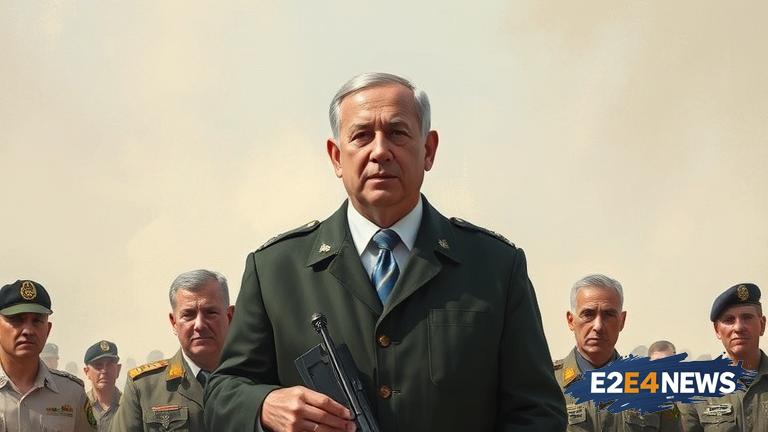The recent statements made by Israeli Prime Minister Benjamin Netanyahu regarding a potential expansion of the war in Gaza have sparked controversy among former Israeli military and spy chiefs. These leaders, who have extensive experience in handling sensitive and complex military operations, have expressed their objections to Netanyahu’s plans, citing concerns over the potential consequences of such actions. They argue that an expanded war in Gaza would lead to a significant increase in civilian casualties, which would not only be morally reprehensible but also strategically counterproductive. Furthermore, they believe that such a move would undermine Israel’s long-term security interests and damage its relationships with other countries in the region. The former military and spy chiefs also point out that the Israeli military has already achieved significant successes in its current operations in Gaza, and that further escalation would be unnecessary and potentially disastrous. They advocate for a more nuanced and diplomatic approach to resolving the conflict, one that takes into account the complex geopolitical dynamics at play and seeks to address the root causes of the violence. Netanyahu’s hints at expanded war in Gaza have also been met with criticism from other quarters, with many arguing that such a move would be a reckless and irresponsible escalation of the conflict. The international community has also expressed concerns over the potential consequences of an expanded war in Gaza, with many calling for restraint and a return to diplomatic efforts to resolve the conflict. Despite these objections, Netanyahu remains committed to his plans, arguing that Israel must take a strong stance against terrorism and protect its citizens from the threat of Hamas and other militant groups. However, the former military and spy chiefs remain skeptical, arguing that Netanyahu’s approach is misguided and that a more thoughtful and strategic approach is needed to address the complex challenges facing Israel. The situation in Gaza remains volatile, with tensions running high and the potential for further violence always present. The international community is watching the situation closely, with many calling for a peaceful resolution to the conflict. The former Israeli military and spy chiefs are not alone in their objections to Netanyahu’s plans, with many other experts and analysts also expressing concerns over the potential consequences of an expanded war in Gaza. They argue that such a move would be a mistake, one that would have far-reaching and devastating consequences for all parties involved. The conflict in Gaza is a complex and deeply entrenched one, with roots that stretch back decades. It will require a thoughtful and nuanced approach to resolve, one that takes into account the complex geopolitical dynamics at play and seeks to address the root causes of the violence. The former military and spy chiefs are calling for a more diplomatic approach to resolving the conflict, one that prioritizes dialogue and negotiation over military action. They believe that this approach is the only way to achieve a lasting and sustainable peace in the region, one that benefits all parties involved. The situation in Gaza remains a major concern for the international community, with many calling for a peaceful resolution to the conflict. The former Israeli military and spy chiefs are playing an important role in highlighting the potential consequences of an expanded war in Gaza, and in advocating for a more thoughtful and strategic approach to resolving the conflict. Their objections to Netanyahu’s plans are significant, and reflect a deep understanding of the complex challenges facing Israel and the region. As the situation in Gaza continues to unfold, it is clear that a peaceful resolution to the conflict will require a concerted effort from all parties involved. The former military and spy chiefs are calling for a more nuanced and diplomatic approach to resolving the conflict, one that prioritizes dialogue and negotiation over military action. This approach is the only way to achieve a lasting and sustainable peace in the region, one that benefits all parties involved. The international community must continue to play an active role in promoting a peaceful resolution to the conflict, and in supporting efforts to address the root causes of the violence. The situation in Gaza is a complex and deeply entrenched one, and it will require a thoughtful and strategic approach to resolve. The former Israeli military and spy chiefs are right to object to Netanyahu’s plans, and to advocate for a more diplomatic approach to resolving the conflict. Their expertise and experience make them uniquely qualified to comment on the situation, and their warnings should be heeded by all parties involved. The conflict in Gaza is a major concern for the international community, and it is imperative that a peaceful resolution is found as soon as possible. The former military and spy chiefs are playing an important role in highlighting the potential consequences of an expanded war in Gaza, and in advocating for a more thoughtful and strategic approach to resolving the conflict. Their objections to Netanyahu’s plans are significant, and reflect a deep understanding of the complex challenges facing Israel and the region. As the situation in Gaza continues to unfold, it is clear that a peaceful resolution to the conflict will require a concerted effort from all parties involved. The former military and spy chiefs are calling for a more nuanced and diplomatic approach to resolving the conflict, one that prioritizes dialogue and negotiation over military action. This approach is the only way to achieve a lasting and sustainable peace in the region, one that benefits all parties involved.





